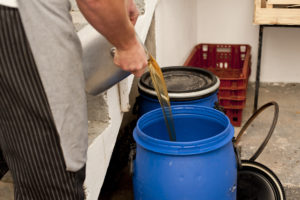In an era of increasing environmental awareness, it’s crucial to shine a light on every facet of sustainability. One area that often goes unnoticed is oil recycling. The improper disposal of oil can have severe consequences for the environment, yet many people remain unaware of the importance of recycling used oil.
In this article, we will explore why oil recycling matters, the benefits it offers, and how individuals and communities can contribute to this vital environmental initiative.

Understanding Oil Recycling
Oil is a ubiquitous substance in modern society, used in everything from powering vehicles to lubricating machinery. However, once oil reaches the end of its useful life, it becomes classified as used oil. Used oil is considered hazardous waste due to its potential to contaminate soil and water sources. When improperly disposed of, used oil can seep into the ground or find its way into waterways, posing serious risks to ecosystems and public health.
Oil recycling is the process of collecting and reprocessing used oil to create new products or energy sources. This process not only prevents environmental contamination but also conserves valuable resources. Despite its benefits, oil recycling remains an underutilized practice in many communities, largely due to a lack of awareness among the general public.

The Importance of Oil Recycling
The importance of oil recycling cannot be overstated. Here are several key reasons why this practice is essential for environmental sustainability:
-
Preventing Pollution
Properly recycling used oil prevents it from contaminating soil, groundwater, and surface water. This helps protect aquatic ecosystems, wildlife, and human health from the harmful effects of oil pollution.
-
Conserving Resources
Oil is a finite resource, and recycling used oil helps conserve it for future generations. By reusing oil instead of extracting new resources, we can reduce our reliance on fossil fuels and decrease the environmental impact of oil production.
-
Reducing Energy Consumption
Recycling used oil requires less energy than refining crude oil to produce new lubricants or fuels. This energy savings helps lower greenhouse gas emissions and mitigate the environmental impact of oil consumption.
-
Promoting Circular Economy
Oil recycling is a prime example of a circular economy in action. Instead of disposing of used oil as waste, recycling allows us to extract additional value from the material, closing the loop and minimizing waste generation.
-
Complying with Regulations
Many regions have strict regulations governing the disposal of used oil. By recycling oil properly, individuals and businesses can ensure compliance with environmental laws and avoid potential fines or penalties.
The Process of Oil Recycling
The process of oil recycling at NJ Oil Recyclers begins with the collection of used oil from various sources, including automotive service centers, industrial facilities, and individual households. Once collected, the oil undergoes a series of filtration and purification steps to remove contaminants and impurities. Next, the purified oil is refined and processed to remove any remaining residues and separate it into different fractions. These fractions can then be used to manufacture new lubricants, fuels, and other oil-based products. Throughout the process, strict quality control measures ensure that the recycled oil meets industry standards and environmental regulations, making it suitable for reuse.

The Benefits of Oil Recycling
In addition to its environmental significance, oil recycling offers numerous benefits for individuals, businesses, and communities. Recycling used oil can be more cost-effective than purchasing new oil products. Many recycling facilities offer collection services free of charge, allowing businesses to save on disposal costs while contributing to environmental protection.
The oil recycling industry provides employment opportunities in collection, transportation, and processing activities. By supporting oil recycling initiatives, communities can stimulate economic growth and create jobs in the green sector. Proper oil recycling with professional companies such as NJ Oil Recyclers helps safeguard public health by reducing exposure to hazardous substances. By preventing oil pollution, recycling efforts contribute to cleaner air, water, and soil, promoting overall well-being for communities.
Community Engagement and Environmental Education
Oil recycling initiatives can bring communities together around a shared goal of environmental stewardship. Participating in recycling programs fosters a sense of pride and responsibility among residents, leading to stronger, more resilient communities. By raising awareness about oil recycling, communities can educate residents about broader environmental issues and the importance of sustainable practices. This increased awareness can inspire individuals to adopt eco-friendly behaviors in other aspects of their lives.

How to Get Involved
Getting involved in oil recycling is easier than you might think. Here are several ways individuals, businesses, and communities can contribute to this important environmental initiative:
-
Recycling Centers
Many municipalities and recycling centers including NJ Oil Recyclers accept used oil for recycling. Check with your local government or waste management facility to find out where you can drop off your used oil safely and conveniently.
-
DIY Recycling
If you perform maintenance on your vehicles or machinery at home, collect the used oil and store it in a leak-proof container. Once you have accumulated a sufficient amount, take it to a designated oil recycling center for proper disposal.
-
Educational Outreach
Spread the word about the importance of oil recycling to friends, family, and colleagues. Share information on social media, organize community workshops or events and encourage others to participate in recycling efforts.
-
Support Legislation
Advocate for policies that promote oil recycling and environmental protection at the local, state, and national levels. Support candidates and initiatives that prioritize sustainability and waste reduction in your area.
-
Choose Sustainable Products
When purchasing lubricants or other oil-based products, opt for eco-friendly options that contain recycled content or are produced using sustainable practices. By supporting responsible manufacturers, you can help drive demand for recycled oil products.
Conclusion
Oil recycling is a critical component of environmental sustainability, yet it often receives less attention than other recycling initiatives. By spreading awareness about the importance of oil recycling and actively participating in recycling efforts, individuals, businesses, and communities can make a positive impact on the environment, conserve resources, and build more resilient communities for future generations. Together, we can ensure that used oil finds new life through recycling, rather than posing a threat to our planet and its inhabitants.



